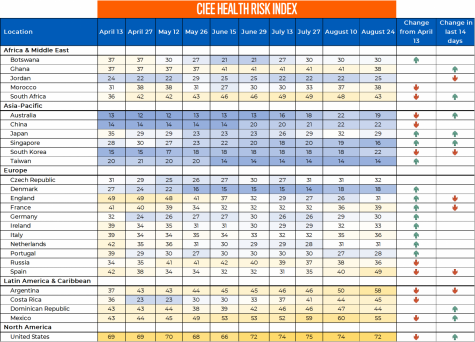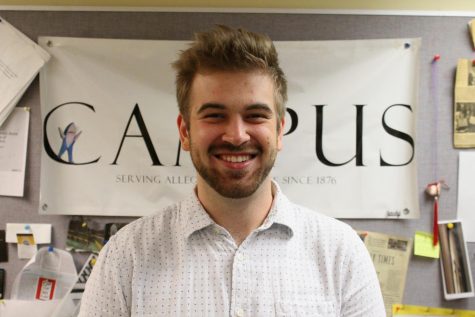Allegheny Study Away Program Adapts to Pandemic
As schools reopen and students travel from all 50 states and even internationally to attend their college or university, travel amidst the pandemic has been a talking point for many.
While many student opportunities at Allegheny are impacted by the pandemic, Lucinda Morgan, director of international education, explained that the study away program faces a very unique situation.
“Probably 90 to 95% of study away programs will be cancelled for the fall,” Morgan said. “Even the big providers that usually have 30 or 40 countries they send to are down to like five. But what we’re hearing — from students especially — is they still want to go.”
Students and study away providers alike are left trying to answer a very important question — is it safe to travel abroad?
“If students want to (travel abroad) in the fall semester they are able to,” Morgan said. “If their programs aren’t cancelled, (and) as long as they’re able to get to the physical location, because there are still places Americans aren’t able to get to, and the program is operating in a safe situation wherever they’re going, (students can still attend). But it’s not just about the community back home — also think of the community you’re going to. Think it all through and keep a realistic perspective of what’s possible and what you’re safe with.”
While international travel became less accessible after travel restrictions were put in place in mid-March, the travel landscape seems to be slowly opening up.
“The state department travel advisories were all at level four since March, meaning travel (was) not recommended for Americans anywhere,” Morgan said. “As of a couple days ago, those have been changing back to level three or level two for a few countries. (At) the CDC, level three is still in effect in a lot of places, but they’re anticipating that to change to level two soon for international locations.”
In addition to the government, independent international education program providers — such as the Council on International Education and Exchange — or CIEE — have been closely monitoring the health and safety of countries around the world, determining whether or not studying in certain places is feasible in the current world climate and providing charts displaying their findings.

“There are questions about safety more than ever,” Morgan said. “Medical insurance and refund policies are going to be asked about a lot more. In the past, most study away programs had (students) commit maybe two or three months ahead of time. The current policy allows students to cancel with no financial penalty 24 hours before or even the day of. They want to reassure students that you’re not financially obligated if something happens and you don’t want to go.”
While health concerns are a prominent issue pertaining to international travel at the moment, they are far from the only one.
“There has been a drastic change in the amount of people traveling — domestically and definitely internationally,” Morgan said. “There are fewer flights. Offices for visas have been closed. It’s been difficult to get a U.S. passport. So there’s been a lot of challenges and hurdles that have happened since the pandemic, no denying that.”
Despite current challenges, providers are still seeking efficient ways to allow study abroad opportunities for students, even if the experience looks a little different.
“You don’t need a visa to visit as long as you’re in the country less than 90 days, so some of the programs have adjusted their calendars. Maybe a 112-day trip was shortened to 88 or 89 days, which makes it more cost-effective,” Morgan said. “For this past spring, most of the programs were cut short physically, but they went online the same way that Allegheny did. So most of the students were still actually able to earn the credits remotely, sadly, from back home rather than the location they were in.”
While students studying abroad during the spring 2020 semester faced an abrupt end to their trips, those who had been preparing for a study away experience this semester are experiencing different challenges.
“I planned on going to Ushuaia, Argentina this fall, but part-way through the summer, I decided not to go,” Grace Hemmelgarn, ’22, said in an email to The Campus. “It was an environmental science program taught entirely in Spanish. I was very worried that trying to go this fall would result in an online semester abroad. While I would still be taking really cool classes, I would be missing the full language and cultural immersion that I want my abroad experience to provide.”
Throughout the process of making this decision, Hemmelgarn consulted her academic advisors and those in the International Education Office in order to create a plan that accommodates her academic needs as well as the experiences she wishes to have in college.
“Fortunately, I was able to transfer my acceptance of the trip to Fall 2022,” Hemmelgarn said. “I made a plan where I will graduate from Allegheny in seven semesters, but keep my original spring 2022 graduation date by taking this semester off. After graduation, I will go abroad on the program I chose.”
While this system seems to be the best possible outcome for students who had planned to study outside the country, students like Hemmelgarn who had been counting on the credits earned during their programs face consequences.
“This change meant changing my Spanish major to a minor, and my study abroad credits will not be part of my time at Allegheny,” Hemmelgarn said. “I chose this plan so my study abroad program will not interfere with my senior comp. I won’t have to pay for nine semesters of undergrad, and it gives the world two years to adjust to COVID before I try to travel. I am very fortunate that I was able to adjust my academic plan, both logistically and financially, to move my study away program to the future.”
Other students travel with the intention of experiencing the world with the bonus of gaining credits. Elizabeth Russo, ’22, followed this train of thought while scheduling her Vietnam Experiential Learning seminar.
“I’m really interested in just traveling any place I can and Vietnam seemed like the most interesting place to go,” Russo said. “From an environmental science standpoint, there’s so much cool wildlife and biodiversity in the Vietnam-Laos-Cambodia area, so I was definitely interested in going for biodiversity reasons. And then also the food there, which is amazing.”
Unlike Hemmelgarn, Russo’s program organizer chose to put the trip off until the world was in a more stable place.
“In about mid-April, they canceled it,” Russo said. “They said maybe we’d go in mid-July or August, or maybe we’d go over Christmas break. Then maybe about a week or so later towards the end of April, they just canceled it altogether.”
While understanding of the current global situation, Russo was still disappointed, especially since she saw this as her last chance to experience traveling as a student.
“I really want to focus on internships next summer, and it’s really hard — pretty much impossible — to do internships and an EL,” Russo said. “I’m working with an outside company to go to Scotland during the spring 2021 semester and that isn’t canceled, so I’m still crossing my fingers that I’ll be able to go. The applications are still open, but who knows what’s going to happen within this semester.”
Although finding a way to squeeze international travel into an already fairly brief time at Allegheny can be stressful — especially during a pandemic — Russo believes it to be a very important part of the college experience.
“In the near future, once things might start to settle down, I’d say just go for it,” Russo said. “Traveling is such a great opportunity and to do it while you’re still in college, it’s one of the best times. Take the opportunities if you really want to travel — just make sure you clear it with your parents, obviously. Check out what the state department website is saying about where you’re traveling to, and if you think it’s okay and it can work out, just go for it.”
Hemmelgarn echoed Russo’s sentiment about the importance of students’ flexibility.
“We are experiencing something new for everyone. We don’t know when or where it will be safe to travel, and our information about the virus changes very quickly,” Hemmelgarn said. “I would say that it’s possible students may be able to go abroad this year, but we all need to be ready to be flexible, think about backup plans, and be ready to change our plans to best protect our physical and mental health, as well as the health of the communities we wish to visit.”
While travel opportunities are available to students, Morgan reiterated that students should be wary of the world around them and take everything into consideration.
“Write down your concerns and think about ways that you can have precautions and be flexible and work around them if possible, but keep a realistic perspective of what’s possible and what you’re safe with,” Morgan said. “If you’re too anxious and not comfortable with the decision, you need to listen to that too and maybe it needs to be delayed a semester. Just be flexible.”

Roman Hladio is a senior from Wexford, Pennsylvania. He is studying English with a creative writing emphasis, and completing requirements for a Journalism...





